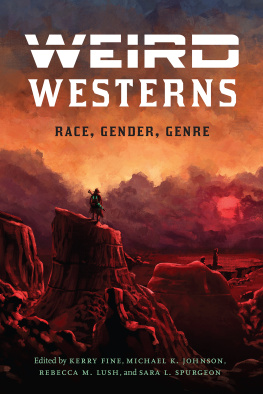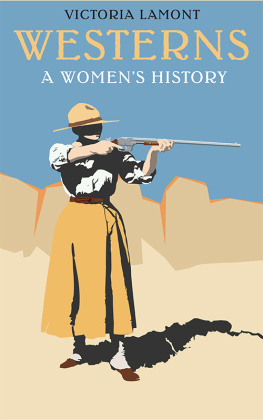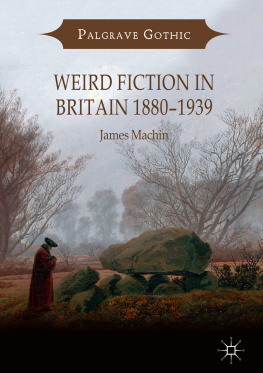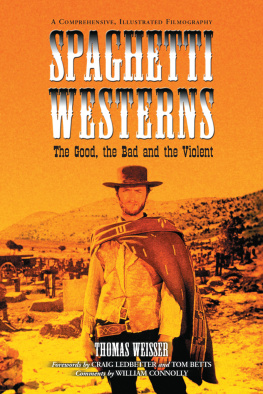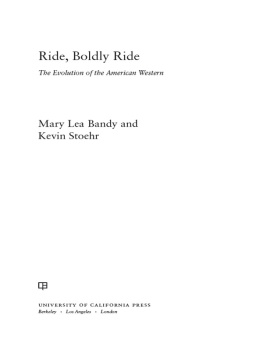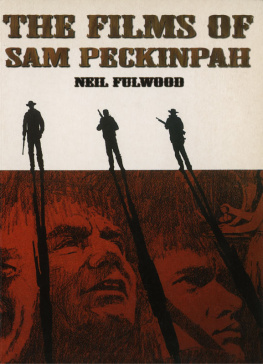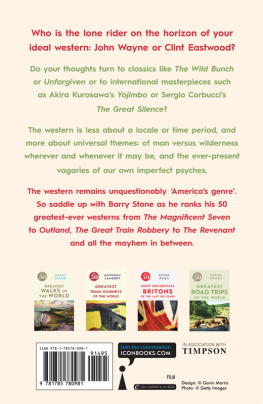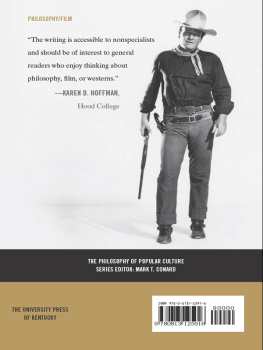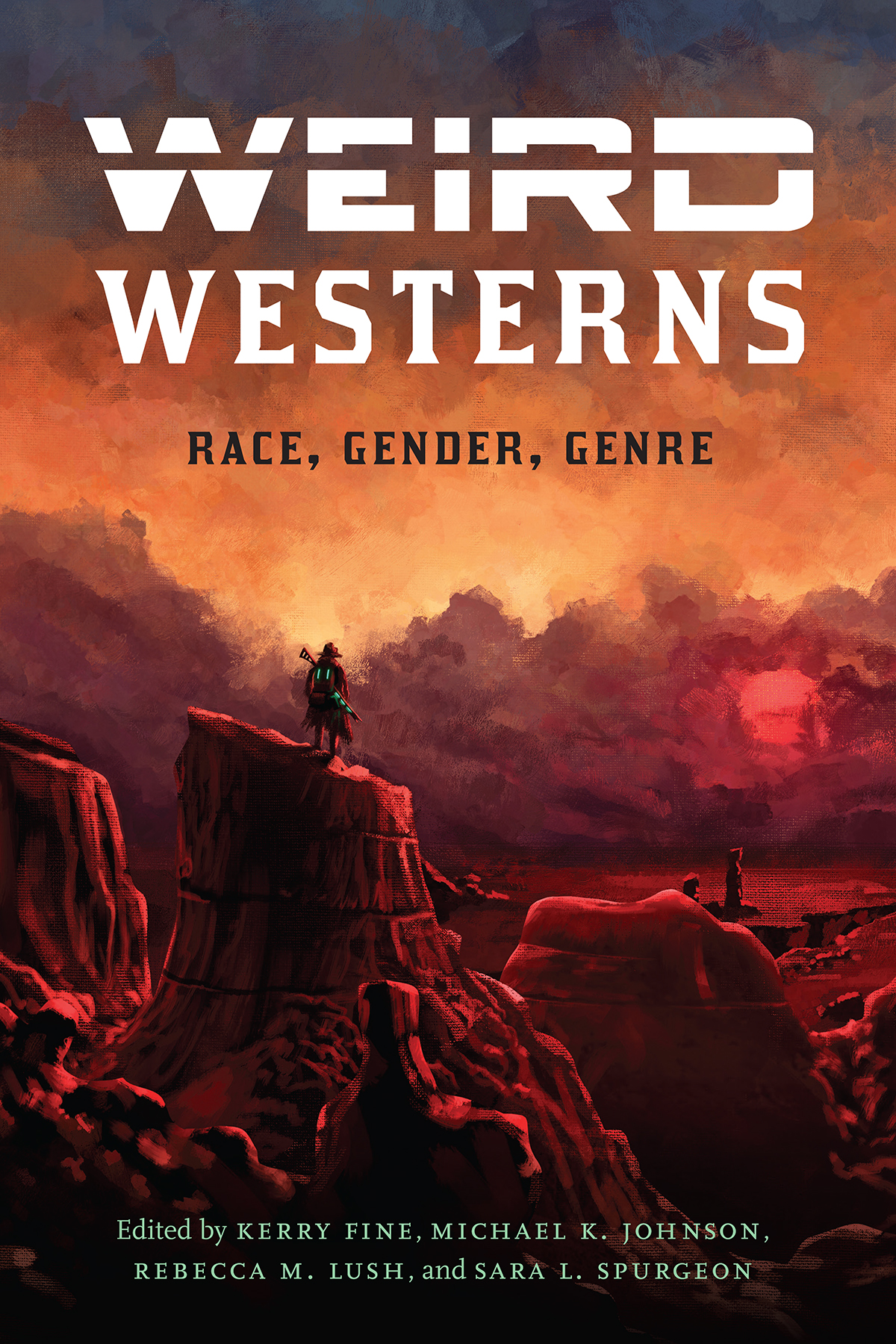
Weird Westerns is a contemplative and compelling foray into the colorful and broad ideological vistas of the western. This compendium of smart, theoretically diverse, and intellectually insurgent essays engages the fantasy construction of the American frontier across multiple mediums of popular consumption and reads as an open-ended challenge to (re)situate and (re)imagine the western regarding race and gender.
Adilifu Nama, author of Super Black: American Pop Culture and Black Superheroes, winner of the American Book Award
This tantalizing collection addresses a wide variety of print, television, and film westerns that incorporate steampunk, zombies, time travel, alternate history, science fiction, and many more influences. Weird Westerns proves that the western continues to be a relevant genre in American popular culture.
Victoria Lamont, author of Westerns: A Womens History
This comprehensive and fascinating journey through the unique landscape of the Weird West analyzes texts from a fresh perspective that resonate with social issues of the present day. From Native American and African American representation to sexual and racial identity, this book will inspire further research and discussion.
Paul Green, author of Encyclopedia of Weird Westerns
This wide-ranging interdisciplinary collection stretches the genre boundaries of the Western into the speculative and the weird and in so doing enables us to think differently and betteruncannilyabout its deep history and its often unquestioned ideological assumptions.
Neil Campbell, author of The Rhizomatic West: Representing the American West in a Transnational, Global, Media Age
Weird Westerns is brave, original, and timely. The editors have compiled an assortment of rich, insightful, and daring scholarship that applies multiple theoretical approaches to the shifting landscapes of the (Weird) Western.
Monica Montelongo Flores, assistant professor of English at California State University, Stanislaus
This exciting volume showed me how weird the complex Western genre has always been: thankfully never living up to what so many pretend it is. With essays by established scholars and illuminating newcomers to the field, we see how the Western has always played, indeed depended, upon questions of race and gender to make sense of itself and of the cultures we live in. It will be a go-to book in the thriving field of western U.S. literary and cultural studies.
William R. Handley, coeditor of True West: Authenticity and the American West
Postwestern Horizons
General Editor
William R. Handley
University of Southern California
Series Editors
Jos Aranda
Rice University
Melody Graulich
Utah State University
Thomas King
University of Guelph
Rachel Lee
University of California, Los Angeles
Nathaniel Lewis
Saint Michaels College
Stephen Tatum
University of Utah
Weird Westerns
Race, Gender, Genre
Edited by Kerry Fine, Michael K. Johnson, Rebecca M. Lush, and Sara L. Spurgeon
University of Nebraska Press | Lincoln
2020 by the Board of Regents of the University of Nebraska
Cover designed by University of Nebraska Press; cover image: Scifi Western Landscape by James Rinere.
All rights reserved.
Library of Congress Cataloging-in-Publication Data
Names: Fine, Kerry, 1974, editor. | Johnson, Michael K. (Michael Kyle), 1963, editor. | Lush, Rebecca M., editor. | Spurgeon, Sara L., editor.
Title: Weird Westerns: race, gender, genre / edited by Kerry Fine, Michael K. Johnson, Rebecca M. Lush, and Sara L. Spurgeon.
Description: Lincoln: University of Nebraska Press, [2020] | Series: Postwestern horizons | Includes bibliographical references and index.
Identifiers: LCCN 2019035378
ISBN 9781496221162 (hardback)
ISBN 9781496221780 (paperback)
ISBN 9781496221742 (epub)
ISBN 9781496221759 (mobi)
ISBN 9781496221766 (pdf)
Subjects: LCSH : Western storiesHistory and criticism. | Western television programsUnited StatesHistory and criticism. | Western filmsUnited StatesHistory and criticism. | Race in literature. | Women in literature. | Race on television. | Women on television. | Race in motion pictures. | Women in motion pictures. | West (U.S.)In literature.
Classification: LCC PS 374. W 4 W 37 2020 | DDC 809.3/874dc23
LC record available at https://lccn.loc.gov/2019035378
The publisher does not have any control over and does not assume any responsibility for author or third-party websites or their content.
Contents
Michael K. Johnson, Rebecca M. Lush, and Sara L. Spurgeon
Tara Penry
Eric Meljac and Alex Hunt
Nicholas William Moll
Joshua T. Anderson
Sara L. Spurgeon
Domino Renee Perez
Johannes Fehrle
Meredith Harvey
Rebecca M. Lush
Jacob Burg
Joshua D. Smith
Michael K. Johnson
Cynthia J. Miller and A. Bowdoin Van Riper
Scott Pearce
Stephen Graham Jones
Westworld(s): Race, Gender, Genre in the Weird Western
Michael K. Johnson, Rebecca M. Lush, and Sara L. Spurgeon
These violent delights have violent ends.
William Shakespeare, Romeo and Juliet, quoted in HBO s Westworld
The western may call up images of Monument Valley, tumbling tumbleweeds, high-noon shoot-outs, and romanticized cowboys and Indians versions of the attempted genocide of indigenous peoples. The genre has also been used by a wide range of authors and filmmakers to communicate myriad contradictory, sometimes even decolonizing, visions. While the classic western has largely been associated with a mythic view of the violent colonization of the nineteenth-century American West, its powerful, evocative, and surprisingly flexible tropes have resulted in infinite revisions and critiques. More than a hundred years after the official close of the last frontier in the American West, and despite being ostensibly anchored to a particular geographic location and a fairly precise point in history, the genre continues to be reinvented and hybridized.
In one of the genres most recent reincarnations, the science fiction and horror western thriller series Westworld (2016present), which HBO describes as being set at the intersection of the near future and the reimagined past, the wealthy guests that visit the high-tech amusement park pay for the chance to live without limits in a world where every human appetite can be indulged. Perhaps one of the distinctive features of the western, as important as the showdown or the desert landscape, is its ability to form unexpected combinations with other genres, and the odd resonance those combinations create between the different genres.
This volume, which analyzes texts as wide-ranging as nineteenth-century literary westerns, supernatural horror westerns, space westerns, alt-history westerns, steampunk westerns, and westerns from the field of Indigenous Futurism, examines the ways authors, filmmakers, and game makers have reimagined the western in tandem with speculative literary traditions. Sometimes these texts function to reinforce the traditional depiction of race and gender in the American West and at other times challenge how race and gender have been operationalized in portrayals of this region (both as it exists in our real world and as it gets imagined in speculative texts) and within the genre of the western. Our collection is attentive especially to how issues of power and privilege are portrayed in weird westerns, which we define as texts that utilize a hybrid genre format, blending canonical elements of the western with either science fiction, fantasy, horror, or some other component of speculative literature.
Next page
